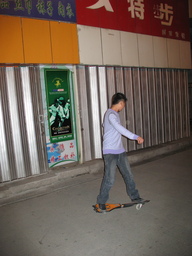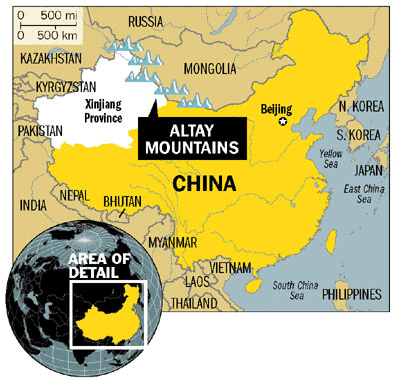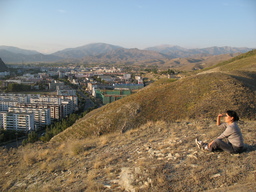
Bomsan on Skateboard
 Bomsan on Skateboard |
Was there some fad I missed? It seems like all the kids in Altai ride around on two-wheeled skateboards--skateboards unlike any other I've seen.
Rather than being crafted from one plank, the board is made up of two separate pieces which are connected by a central, pivoting axle beneath. The wheels light up when spinning; I assume there's some sort of LED inside.
I've never seen these skateboards elsewhere. I presume that the local skateboarders are following some trend that must have already died off before the recent time I spent in the U.S.. Altai is remote--relative to not just the rest of China but also to the rest of the world.
Or perhaps these skateboards are a sign that Altai is again on the cutting edge. A couple years ago there were proud reports in the Chinese press that it was China that invented skiing--never mind far older artifacts having been excavated in Scandinavia. The reports pointed to current minority practices througout the Altai area and 2,000-year old leather boots with wooden planks attached to the soles. Locals today still use a similar contraption to slip down icy slopes.
 To claim that it was the Chinese who invented skiing is something of a stretch. Even today, the population of the Altai region is predominantly composed of ethnicities other than Han Chinese, among them Kazakh, Mongol, and Tuvan. It's beyond dispute that whoever it was who stuck those planks onto their boots 2,000 years ago was not ethnic Chinese. But, as a corner of the Altai region now falls into the borders of today's China, headlines in the Chinese media proudly played the discovery up.
To claim that it was the Chinese who invented skiing is something of a stretch. Even today, the population of the Altai region is predominantly composed of ethnicities other than Han Chinese, among them Kazakh, Mongol, and Tuvan. It's beyond dispute that whoever it was who stuck those planks onto their boots 2,000 years ago was not ethnic Chinese. But, as a corner of the Altai region now falls into the borders of today's China, headlines in the Chinese media proudly played the discovery up.
I'm spending my time here in Altai together with Meenday. We'll be traveling for a little over a week around northern Xinjiang. At the moment we're staying with a classmate of hers from university, Booyinagaar. After a couple days here visiting the city of Altai, Meenday and I will head out to explore more of the region.
The Altai area may be mountainous and with large numbers of unsettled nomads, but I've found the city of Altai feels much the same as any other small city in Xinjiang today. Clusters of tall apartment blocks, cheap taxis, and a single branch each of the Xinhua Bookstore and the burger chain Best Food.
It's only the immediate years that have transformed Altai into a typical Chinese city; perhaps that development will soon stall. I've heard from a couple people around town that everything is slated to move further south next year to Bei Tun, another average Chinese city Meenday and I passed through on our way up. After opening a railway link sometime next year, Bei Tun is supposed to take over as the administrative center of Chinese Altai.
This city in which we're staying is not the only city named "Altai". Altai is the point where the borders of China, Mongolia, Russia, and Kazahstan meet. No matter the name of the country, it's all still Altai out here. I was not far from our present location--though on the other side of the border--two years ago. That was when I unsuccessfully attempted to enter Xinjiang from Mongolia. On the way to the border I recall passing through at least two other towns within Mongolia also named "Altai". I think there might also be a city named "Altay" in Kazakhstan and another as well in Russia--though am not positive about those latter two.
Meenday says that the word altai is of Mongol origin, meaning "gold". That seems plausible. In the Uighur language (which is distantly related to Mongol) the word for gold is altun.
I'm fascinated by other dynamics of language about me. Meenday speaks with her classmate Booyinagaar (in whose home we're staying) in a different dialect of Mongol than she speaks with people from her hometown. Booyinagaar in turn speaks a wholly unrelated language--Chinese--with her son, Bomsan. It's readily apparent that his is the generation when language dies. By merely knowing how to say "hello" and "thank you" in Mongol, I know more phrases in that tongue than Bomsan does.
 Meenday in Hills above Altai |
Tall, lanky, and 13 years old Bomsan is yet young enough to behave innocently and free of pretense. In addition to showing off tricky maneuvers on his skateboard, he's repeatedly professed to me his fondness for Korean soap operas: "Korea is so cool! The fashion, everything! Don't you think so?" I concur, hoping he can not tell that I'm fibbing.
Typical Chinese city or not, I've enjoyed the leisurely pace of life in Altai. Our choice of activity after dinner this evening was to take an aimless stroll about town. Bomsan zipped extended loops around the three of us, wheeling up and down the pavement. Even with social obligations and an afternoon spent exploring the hills near the city I've managed to relax with time to myself. This morning I made an impulse-buy at the Xinhua Bookstore: a book of sudoku puzzles. I hadn't tried sudoku before, but have already managed to complete a few of the simpler puzzles.
I think I may quickly become addicted.